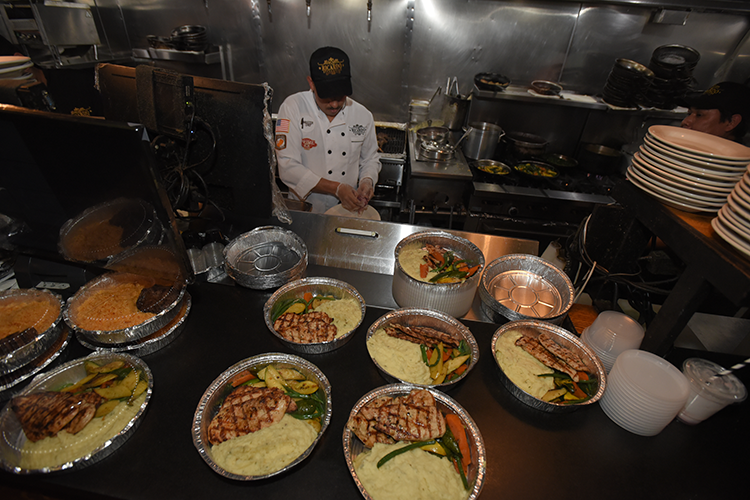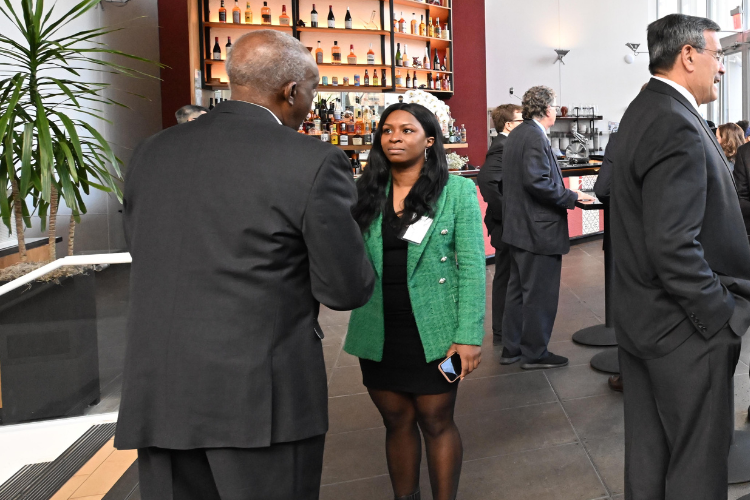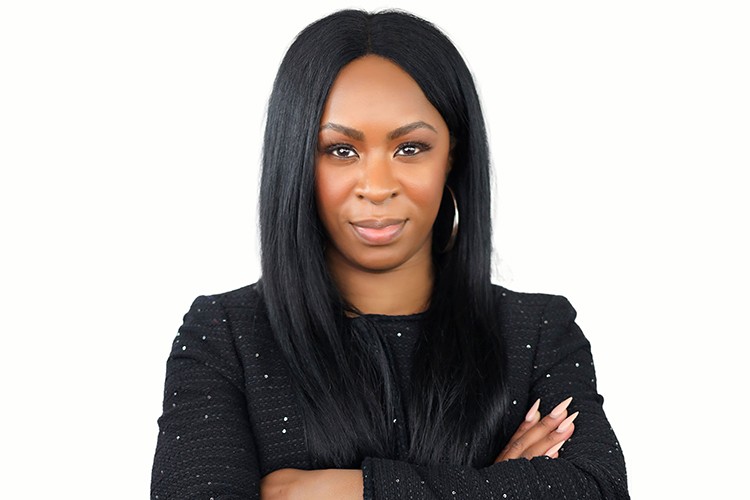Harlem Native Phoebe-Sade Arnold’s Uptown Roots and Reverence Run Deep
We spoke with Columbia University’s Director of Community Affairs about growing up in Harlem and her social impact-driven career journey.
Walking across 135th Street conjures a sense of nostalgia for Phoebe-Sade Arnold. Along the sidewalks that line the Uptown thoroughfare, and its surrounding blocks, stand spaces that have instrumentally shaped the Harlem native’s path.
Neighborhood institutions like the Countee Cullen Library and the Schomburg Center for Research in Black Culture are where she would spend her Saturday afternoons diving into the work of literary greats as a child. Her high school—on the corner of 135th St. and 7th Avenue and named after revered civil rights lawyer Thurgood Marshall—was where she witnessed her mother fearlessly fight for equity in education. A few blocks north on 138th St. stands the historic Abyssinian Baptist Church where, under the tutelage of the late Reverend Dr. Calvin O. Butts III, she saw the power that lies within community service.
“135th Street will always have a special place in my heart,” she shared. “I always feel immediately at home when I’m there.”
For Arnold, who is the director of Community Affairs at Columbia University and leads an array of local social impact initiatives, reverence for the neighborhood is what guides her and she uses the needs of Uptown residents as a compass to inform her work.
Columbia Neighbors recently spoke with Arnold about the inspiration behind her career, how she navigates a role that sits at the intersection of Columbia and the community, and her favorite Uptown gems.
How has being raised in Harlem shaped your journey?
I was raised primarily by my mom. I have three sisters. Growing up in a household full of women, you learn to be very vocal early on. My siblings and I all ended up working in the education space in some type of capacity because it was always a highlighted value that was passed on through my mom to us. She always stressed that if you have a good education and a solid foundation, you can do whatever you want.
I always tell my mom I didn’t know we were "low-income" until I applied for college and started to look at the students that I was competing against to get into these prestigious schools. I realized that there were resources and opportunities that I hadn’t been exposed to just by the nature of where I lived and where I was from. I think a lot of those things are systemic. I started to see the dichotomy between what growing up here means versus growing up in a more affluent community.
Seeing those disparities while coming of age influenced me and my sisters’ paths in the education space. We all just recognized that this is the groundwork and if we’re going to all be community advocates it’s a good space to be in because a quality education can take you so far. Reverend Dr. Calvin O. Butts III was one of my mentors and one of his quotes that resonated with me throughout my career is:
“Education and faith are the Tigris and the Euphrates of our liberation: twin rivers at the source of our redemption.”
It points to the fact that a solid education can take you so far.
What is your earliest memory of witnessing the power of community impact?
My mom would always say, I can’t afford to send you to private school so we’re going to fight for you to get the best education possible right here in our community. My mom was always a fierce advocate for equity in education. She was on my school's leadership team and Parents Association. One of the earliest things she advocated for was that every teacher in the school building be certified before they taught us. Her mantra was 'if you aren’t certified then you shouldn’t be teaching my child.' This was an uphill battle, but she mobilized the parents and they were eventually successful in setting this standard.
That is one of my first signs of community impact. The process was contentious, but necessary. My mom was like, "I’m going to use what I have. I’m going to use my voice. I’m going to take off from work. I’m going to be in the building. I’m going to require things." That was the type of advocacy that I learned from. You can fight for the quality education you need no matter where you are. Don’t allow yourself to be a victim of circumstance. Her efforts changed the policy of my high school. It really raised the bar. It showed me that when you push through you can get the results you want, even if it’s a not-so-fun, typically uncharted path.
What inspired you to chart a path in the community affairs space? What led you to Columbia?
Growing up in Harlem, we always heard so much about Columbia and what the institution was doing to the community. You never heard the flip side of that. When I thought about where I would fit in, Government and Community Affairs was a natural path for me because I wanted the opportunity to learn the narrative for myself.
If there are things that the community could benefit from, why not be in that space where I could help to influence that? I think I have a very good understanding of my community’s needs and having an MPA gives me an understanding of the different systems and processes. Education and providing community resources is a perfect intersectionality for me.
What are some of the initiatives that you and your team at Columbia have worked on that you’re most proud of?
The pandemic presented an opportunity for the university to step up and use its resources in some very tangible, direct ways to benefit the community. The “grab and go” initiative was created as a way to be of service to residents and local businesses. For the restaurants that we supported, we purposely didn’t go with large chains. We know the pandemic was rough on everyone, particularly restaurants though because no one was going and eating there. It was really hard to meet their bottom line.
During the pandemic, I was proud of the way Columbia stepped up through the “grab and go” initiative and the Pivot Loans program. I was involved in the outreach and making sure local businesses knew these relief options were available. We heard from businesses who shared that their PPP funds had dried up and Columbia was an alternative route for them to get this really important aid.
With our “grab and go” project, we put the focus on serving seniors and other under-resourced residents in Harlem. This effort was about more than donating food, we wanted to create an experience. Many of these residents have to walk past these businesses every day because they can’t afford to dine there. To me, this was a really direct way to put something in the hands of people. It was a positive situation all around. It also gave the university an opportunity to be present in a way that it hadn’t before.
Beyond that, we’ve sponsored holiday celebrations at local senior centers and enlisted local vendors. We were able to provide funds to help them create memorable experiences that they otherwise would not have.

Can you talk about how building a career based on service to the community has shaped who you are today?
I always knew that I wanted to work in my community. Being able to experience Harlem pre-gentrification gives you a love and appreciation for it because you know there’s no other place like it in the world. The Mart 125 was a place where you would go and experience hyperlocal vendors. It was a shopping experience you couldn’t get downtown on 5th Avenue. It was immersed in culture. Soul food is one of the earmarks of the Harlem culture and the Black experience and we had some of the best from Sylvia’s to Pan Pan.
These are places that shaped who I am because they provided a sense of community for me. They instilled and built up a sense of pride in my community. There is no other place like Harlem. I always knew I was going to work in a way to preserve that and to support it however I could. I think if you’re living here, you’re special. I think if you’re here, it’s a privilege. There wasn’t another community I could see myself ever being as passionate for or about other than the community that raised me.
There wasn’t another community I could see myself ever being as passionate for or about other than the community that raised me.
What would you say is the most rewarding part of your role at Columbia?
Being able to impact the thinking of internal decision-makers and guiding them toward a more positive-sum situation for both the university and our surrounding communities is the most rewarding part of what I do. The impact and changes made will be here way longer than I am. Effecting systemic change is really hard to do, but it starts with the mindsets of people and seeing that change is super rewarding.

You were recently appointed by Mayor Eric Adams to serve on the New York City Department of Education’s Panel for Educational Policy. What has been your biggest takeaway so far?
Although it's still early in my tenure, it's very apparent to me that everyone, from my fellow Panel for Educational Policy members to the staff of the Dept. of Education, to the concerned residents who attend the briefings and meetings alongside us, cares deeply about the quality of education offered here in New York City. Despite the long hours and constant influx of information to synthesize, everyone shows up ready to work collaboratively and has a common goal to create an education system we can all be proud of. As a product of the NYC public school system, this is a full circle moment for me, and I'm honored to serve in such an impactful role.
Who or what are you inspired by?
Definitely my mom. All that I saw her do serves as inspiration for me because I recognize how hard it must have been for her in her position as a fierce advocate and what she was up against. In adulthood, seeing it from the flip side and a real systems perspective; navigating those systems by herself must have been extremely difficult. If she had the tenacity and the drive to do it, then I can do it too. It’s like almost nothing is impossible, I just need to work at it.
My sisters also inspire me because they’re boots on the ground in the education space. They’re dealing with underfunded schools. I think we all know how teachers are at the forefront of all of this and do not get paid enough. I sometimes view the work that I do as supplementary to the work they’re doing in the classroom. They’re fighting within a system I’m trying to help to strengthen.
What’s the best piece of advice you’ve ever received?
I’m a proud SUNY Old Westbury graduate. My mentor Dr. Butts, who served as the President of my college, always charged us to not view our "state education" as a hindrance. Just because you’re getting a public education, doesn’t mean you’re in any way devalued. He always empowered us to think the most of ourselves. Own every space and show up as your full self at all times. You are enough.
Own every space and show up as your full self at all times. You are enough.
What are your favorite Uptown spots?
My favorite park in Harlem is Central Park. I don’t think people realize it runs Uptown too. It is really beautiful at all times of the year. The Harlem Meer is there. I love the area. Being in that park is an extension of one of the world’s most famous parks. Uptown is a really important part of it.
Another spot is The Apollo Theater. I would grow up watching "Showtime at The Apollo" and I would stay up late to watch the Sandman come out or Kiki Shepard put her hand over the different acts. As an adult, being able to go and witness these things in person in this historic theater was top-tier for me.
Another landmark would be the Abyssinian Baptist Church just because of its rich history and all it represents.
Lastly, but most importantly, 135th Street, the corridor itself. From St. Nicholas Park all the way over to Fifth Ave. We have many corridors Uptown, but I’m literally from 135th between Adam Clayton Powell and Malcolm X Boulevard. That was my little stomping ground. 135th Street will always have a special place in my heart. I always feel immediately at home when I’m on 135th Street at any point.
